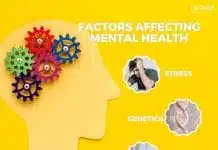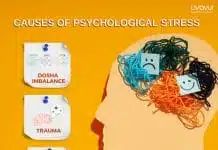
Workaholism or work addiction is a mental health condition in which a person is addicted to work. Like any other addiction, a person suffering from workaholism also gets a ‘high’ by excessive working and continues to repeat this pattern. They might be aware of all the negative impacts work addiction might be causing in their lives, but they simply can’t stop because they are addicted to it. It is often characterised by the need to achieve a job status or career success, but it is different from ambition. In workaholism, a person doesn’t care about emotional distress or personal issues. Their addiction to work surpasses any emotional crisis.
Symptoms of Workaholism
- Working for prolonged hours, even when it is not required
- Obsession with the success at work
- Intense fear of failure at a project at work
- Working excessively to avoid relationships
- Avoiding sleep for work projects
- Working to cope up with guilt and depression
- Working excessively to avoid dealing with any emotional crisis
Psychological Disorders Found in Workaholics
Workaholics are at a higher risk of psychological disorders. These disorders may be the causes of work addiction, or they might be the consequences arising as a result of work addiction. The four main psychological disorders tied up with workaholism are ADHD, OCD, anxiety and depression. As compared to non-workaholics, workaholics score a higher percentage of having these psychological disorders.
ADHD (Attention-Deficit Hyperactivity Disorder)

ADHD is usually characterised by inattentiveness, lack of focus, impulsiveness and/or excessive physical activity. People with ADHD have trouble focussing on the task at hand, as compared to their colleagues. Hence, they might have to spend a longer duration of time trying to finish up the same project. Also, many people suffering from ADHD work better in environments with less noise and distractions. So, they might prefer to work after everyone has left, leading to excessive hours of work. This creates a cycle of procrastination and work addiction.
The impulsive nature of ADHD people makes them take extra work than they are able to handle, again leading to a cycle of work addiction. In order to control or pacify their hyperactive nature, they need to be constantly active. Work stress and excessive work act as a stimulant in this context, leading to workaholism.
Rather than acting as a cause, ADHD may also be developed as a result of workaholism.
OCD (Obsessive Compulsive Disorder)

OCD is a physiatric disease that is generally characterised by excessive and intrusive thoughts leading to repetitive behaviour. Workaholics have been found to have obsessive-compulsive traits, such as obsessing over tiny details of perfection, need to control things, etc.
Workaholism is a kind of obsessive behaviour and it is possible that this addiction is the reason behind the development of OCD in workaholics. It is also possible that work addiction is used as a coping mechanism to OCD induced behaviour and workaholism is a direct consequence of OCD.
Anxiety and Depression

Anxiety and depression are commonly found psychiatric disorders in workaholics. People suffering from anxiety and depression may get addicted to working excessively as it alleviates their negative feelings and also helps them enhance their self-esteem. It acts as an escape mechanism in this scenario.
In another possible context, anxiety and depression may develop as a result of excessive working and fear of failure at work. Either ways, anxiety and depression are closely related psychological disorders in workaholics.
Takeaway
Work addiction or workaholism may result in many psychological disorders or may arise due to such disorders. In either case, the ties between workaholism and psychological disorders are closely related. There is a possibility of treatment of workaholism by identifying the disorder related to it and getting it treated. In most cases, work addiction acts as an escape or coping mechanism to the symptoms arising due to these disorders.





















Its superb as your other posts : D, appreciate it for posting. “As experience widens, one begins to see how much upon a level all human things are.” by Joseph Farrell.
Keep working ,impressive job!
Hi there! This post couldn’t be written any better! Reading through this post reminds me of my previous room mate! He always kept talking about this. I will forward this article to him. Pretty sure he will have a good read. Thank you for sharing!
I really appreciate this post. I’ve been looking everywhere for this! Thank goodness I found it on Bing. You have made my day! Thanks again
Hi, Neat post. There is a problem with your site in internet explorer, would check this… IE still is the market leader and a huge portion of people will miss your great writing because of this problem.
Purdentix
Purdentix reviews
Purdentix reviews
Purdentix
Purdentix review
Purdentix review
I’m really impressed by the speed and responsiveness.
This site truly stands out as a great example of quality web design and performance.
The design and usability are top-notch, making everything flow smoothly.
I love how user-friendly and intuitive everything feels.
I love how user-friendly and intuitive everything feels.
I’m really impressed by the speed and responsiveness.
I’m really impressed by the speed and responsiveness.
I love how user-friendly and intuitive everything feels.
The content is engaging and well-structured, keeping visitors interested.
A perfect blend of aesthetics and functionality makes browsing a pleasure.
The layout is visually appealing and very functional.
The layout is visually appealing and very functional.
The design and usability are top-notch, making everything flow smoothly.
The content is well-organized and highly informative.
This website is amazing, with a clean design and easy navigation.
This website is amazing, with a clean design and easy navigation.
It provides an excellent user experience from start to finish.
A perfect blend of aesthetics and functionality makes browsing a pleasure.
The design and usability are top-notch, making everything flow smoothly.
The content is well-organized and highly informative.
The content is well-organized and highly informative.
This site truly stands out as a great example of quality web design and performance.
I love how user-friendly and intuitive everything feels.
It provides an excellent user experience from start to finish.
I’m really impressed by the speed and responsiveness.
The content is engaging and well-structured, keeping visitors interested.
I’m really impressed by the speed and responsiveness.
It provides an excellent user experience from start to finish.
AQUA SCULPT REVIEWS
This website is amazing, with a clean design and easy navigation.
This website is amazing, with a clean design and easy navigation.
It provides an excellent user experience from start to finish.
This website is amazing, with a clean design and easy navigation.
This site truly stands out as a great example of quality web design and performance.
The content is engaging and well-structured, keeping visitors interested.
I love how user-friendly and intuitive everything feels.
The layout is visually appealing and very functional.
The content is engaging and well-structured, keeping visitors interested.
The design and usability are top-notch, making everything flow smoothly.
The content is engaging and well-structured, keeping visitors interested.
The layout is visually appealing and very functional.
A perfect blend of aesthetics and functionality makes browsing a pleasure.
This site truly stands out as a great example of quality web design and performance.
A perfect blend of aesthetics and functionality makes browsing a pleasure.
This site truly stands out as a great example of quality web design and performance.
I’m really impressed by the speed and responsiveness.
I love how user-friendly and intuitive everything feels.
A perfect blend of aesthetics and functionality makes browsing a pleasure.
The layout is visually appealing and very functional.
I’m really impressed by the speed and responsiveness.
I’m really impressed by the speed and responsiveness.
The layout is visually appealing and very functional.
It provides an excellent user experience from start to finish.
The design and usability are top-notch, making everything flow smoothly.
The content is engaging and well-structured, keeping visitors interested.
I love how user-friendly and intuitive everything feels.
The layout is visually appealing and very functional.
It provides an excellent user experience from start to finish.
ICE WATER HACK FOR WEIGHT LOSS
This site truly stands out as a great example of quality web design and performance.
The content is well-organized and highly informative.
I’m really impressed by the speed and responsiveness.
This website is amazing, with a clean design and easy navigation.
The content is engaging and well-structured, keeping visitors interested.
This site truly stands out as a great example of quality web design and performance.
This website is amazing, with a clean design and easy navigation.
The content is well-organized and highly informative.
I love how user-friendly and intuitive everything feels.
This website is amazing, with a clean design and easy navigation.
This website is amazing, with a clean design and easy navigation.
The content is engaging and well-structured, keeping visitors interested.
A perfect blend of aesthetics and functionality makes browsing a pleasure.
I’m really impressed by the speed and responsiveness.
Open-world games are the best! Nothing beats the feeling of total freedom, exploring vast landscapes, and creating your own adventure.
Christopher Nolan’s storytelling is always mind-blowing. Every movie feels like a masterpiece, and the way he plays with time and perception is just genius.
A good book isn’t just entertainment—it’s a portal to another world. The best stories stay with you long after you’ve turned the last page.
Nothing beats homemade pasta. The texture and flavor are just on another level compared to store-bought versions. Cooking from scratch is truly an art.
An impressive share, I just given this onto a colleague who was doing a little analysis on this. And he in fact bought me breakfast because I found it for him.. smile. So let me reword that: Thnx for the treat! But yeah Thnkx for spending the time to discuss this, I feel strongly about it and love reading more on this topic. If possible, as you become expertise, would you mind updating your blog with more details? It is highly helpful for me. Big thumb up for this blog post!
Friendship, some say, is a single soul residing in two bodies, but why limit it to two? What if friendship is more like a great, endless web, where each connection strengthens the whole? Maybe we are not separate beings at all, but parts of one vast consciousness, reaching out through the illusion of individuality to recognize itself in another.
All knowledge, it is said, comes from experience, but does that not mean that the more we experience, the wiser we become? If wisdom is the understanding of life, then should we not chase every experience we can, taste every flavor, walk every path, and embrace every feeling? Perhaps the greatest tragedy is to live cautiously, never fully opening oneself to the richness of being.
Even the gods, if they exist, must laugh from time to time. Perhaps what we call tragedy is merely comedy from a higher perspective, a joke we are too caught up in to understand. Maybe the wisest among us are not the ones who take life the most seriously, but those who can laugh at its absurdity and find joy even in the darkest moments.
Friendship, some say, is a single soul residing in two bodies, but why limit it to two? What if friendship is more like a great, endless web, where each connection strengthens the whole? Maybe we are not separate beings at all, but parts of one vast consciousness, reaching out through the illusion of individuality to recognize itself in another.
The cosmos is said to be an ordered place, ruled by laws and principles, yet within that order exists chaos, unpredictability, and the unexpected. Perhaps true balance is not about eliminating chaos but embracing it, learning to see the beauty in disorder, the harmony within the unpredictable. Maybe to truly understand the universe, we must stop trying to control it and simply become one with its rhythm.
The essence of existence is like smoke, always shifting, always changing, yet somehow always present. It moves with the wind of thought, expanding and contracting, never quite settling but never truly disappearing. Perhaps to exist is simply to flow, to let oneself be carried by the great current of being without resistance.
The cosmos is said to be an ordered place, ruled by laws and principles, yet within that order exists chaos, unpredictability, and the unexpected. Perhaps true balance is not about eliminating chaos but embracing it, learning to see the beauty in disorder, the harmony within the unpredictable. Maybe to truly understand the universe, we must stop trying to control it and simply become one with its rhythm.
Time is often called the soul of motion, the great measure of change, but what if it is merely an illusion? What if we are not moving forward but simply circling the same points, like the smoke from a burning fire, curling back onto itself, repeating patterns we fail to recognize? Maybe the past and future are just two sides of the same moment, and all we ever have is now.
Time is often called the soul of motion, the great measure of change, but what if it is merely an illusion? What if we are not moving forward but simply circling the same points, like the smoke from a burning fire, curling back onto itself, repeating patterns we fail to recognize? Maybe the past and future are just two sides of the same moment, and all we ever have is now.
The essence of existence is like smoke, always shifting, always changing, yet somehow always present. It moves with the wind of thought, expanding and contracting, never quite settling but never truly disappearing. Perhaps to exist is simply to flow, to let oneself be carried by the great current of being without resistance.
If everything in this universe has a cause, then surely the cause of my hunger must be the divine order of things aligning to guide me toward the ultimate pleasure of a well-timed meal. Could it be that desire itself is a cosmic signal, a way for nature to communicate with us, pushing us toward the fulfillment of our potential? Perhaps the true philosopher is not the one who ignores his desires, but the one who understands their deeper meaning.